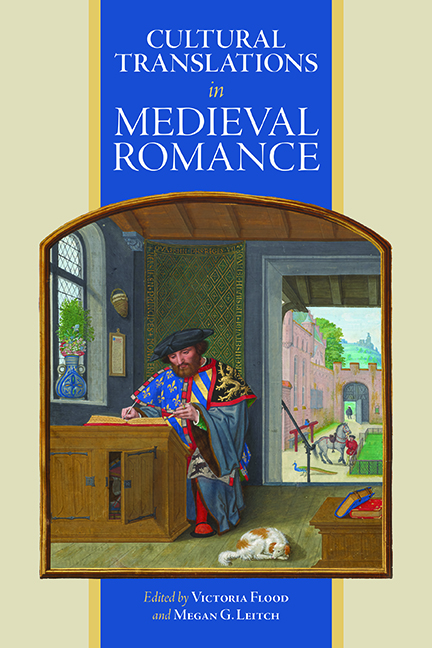Book contents
- Frontmatter
- Contents
- List of Contributors
- List of Abbreviations
- Introduction Insular Romance in Translation: New Approaches
- 1 Romantic Wales: Imagining Wales in Medieval Insular Romance
- 2 ‘Something remains which is not open to my understanding’: Enigmatic Marvels in Welsh Otherworld Narratives and Latin Arthurian Romance
- 3 The Supernatural Company in Cultural Translation: Dafydd ap Gwilym and the Roman de la Rose Tradition
- 4 Women and Werewolves: William of Palerne in Three Cultures
- 5 ‘Better a valiant squire than a cowardly knight’: Gender in Guruns strengleikr (The Lay of Gurun)
- 6 ‘Vinegar upon Nitre’? Walter Map’s Romance of ‘Sadius and Galo’
- 7 The Three Barriers to Closure in Hue de Rotelande’s Ipomedon and the Middle English Translations
- 8 Trojan Trash? The Seege or Batayle of Troye and the Learning of ‘Popular’ Romance
- 9 Poaching Romance: Fan Fiction Theory and Shared Medieval Narratives
- 10 Between Epic and Romance: The Matter of England and the Chansons de Geste
- 11 Geographies of Loss: Cilician Armenia and the Prose Romance of Melusine
- 12 ‘All this will not comfort me’: Romancing the Ballad in The Squire of Low Degree
- 13 Merchants in Shining Armour: Chivalrous Interventions and Social Mobility in Late Middle English Romance
- Index of Manuscripts
- General Index
- Miscellaneous Endmatter
9 - Poaching Romance: Fan Fiction Theory and Shared Medieval Narratives
Published online by Cambridge University Press: 07 October 2022
- Frontmatter
- Contents
- List of Contributors
- List of Abbreviations
- Introduction Insular Romance in Translation: New Approaches
- 1 Romantic Wales: Imagining Wales in Medieval Insular Romance
- 2 ‘Something remains which is not open to my understanding’: Enigmatic Marvels in Welsh Otherworld Narratives and Latin Arthurian Romance
- 3 The Supernatural Company in Cultural Translation: Dafydd ap Gwilym and the Roman de la Rose Tradition
- 4 Women and Werewolves: William of Palerne in Three Cultures
- 5 ‘Better a valiant squire than a cowardly knight’: Gender in Guruns strengleikr (The Lay of Gurun)
- 6 ‘Vinegar upon Nitre’? Walter Map’s Romance of ‘Sadius and Galo’
- 7 The Three Barriers to Closure in Hue de Rotelande’s Ipomedon and the Middle English Translations
- 8 Trojan Trash? The Seege or Batayle of Troye and the Learning of ‘Popular’ Romance
- 9 Poaching Romance: Fan Fiction Theory and Shared Medieval Narratives
- 10 Between Epic and Romance: The Matter of England and the Chansons de Geste
- 11 Geographies of Loss: Cilician Armenia and the Prose Romance of Melusine
- 12 ‘All this will not comfort me’: Romancing the Ballad in The Squire of Low Degree
- 13 Merchants in Shining Armour: Chivalrous Interventions and Social Mobility in Late Middle English Romance
- Index of Manuscripts
- General Index
- Miscellaneous Endmatter
Summary
By current critical understanding of the aesthetic difference between high and popular romance, authors like Thomas Chestre (fourteenth century) and the anonymous authors of The Greene Knight (c. 1500), Torrent of Portyngale (c. 1400) and Sir Gowther (mid to late fifteenth century) can only fail to impress. Chestre's work has seemed unfocused and amateurish, while the Greene Knight appears to academic audiences as a bad misunderstanding of Sir Gawain and the Green Knight. But if we use a different critical lens – that of fan fiction – we might reorient our approach to what motivates people to write and tell stories in the late Middle Ages. Modern fan fiction theory is a useful way of illuminating how medieval popular romance works because it helps to move us past modern notions of both textual authority and writing for profit, although it is also necessary not to collapse all distinctions between medieval literature and modern fan texts. Using Henry Jenkins’ theory of ‘textual poaching’, authors like Chestre look rather more like ‘readers who appropriate popular texts and reread them in a fashion that serves different interests’. Chestre's work, Torrent, and the Greene Knight engage with new social interests or produce fan-friendlier versions of difficult or ambiguous narratives; Sir Gowther links romance to apocalyptic eschatology through the figure of Merlin. All four participate in a popular view of history as something organised around and by chivalry and chivalric identity. I will argue that to some extent this will not be a new apparatus, but a shifting of focus, partly concerning authorial intention and partly concerning perceived aesthetic effect. Fan fiction, then, offers a new way to interpret the radical translation into the vernacular – of earlier aristocratic ethos, of eschatological prediction – represented by late Middle English romance, where the focus becomes the entertaining of both one's self and one's audience. Textual poaching imagines a diegetic field – a body of story – as a game preserve, bordered and guarded. The fan fiction writer defies authority in order to translate material across those borders. Jenkins’ other term for fan fiction practitioners is, after all, ‘nomads’.
Fan fiction is different from adaptation, although they share significant features. The idea of textual poaching has been expanded and questioned. Juli J. Parrish argues that fan fiction writers ‘reimagine the preserve itself’, the landscape in which the poaching takes place transformed by their activity.
- Type
- Chapter
- Information
- Cultural Translations in Medieval Romance , pp. 173 - 190Publisher: Boydell & BrewerPrint publication year: 2022



